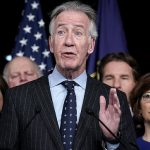A federal judge on Saturday blocked a President Donald Trump administration rule requiring migrants to prove that they had insurance or could pay for medical care before they can obtain visas.
U.S. District Court Judge Michael Simon in Portland, Oregon, issued a temporary restraining order the day before the policy was set to go into effect.
The October proclamation required that prospective migrants demonstrate that they could obtain health insurance within 30 days of arriving in the United States — a demand that immigration and health experts said would be particularly onerous for low-income migrants who may not be coming to the U.S. for a job that provided health insurance or who may be unable to pay for foreseeable medical costs. Experts warned that the policy would favor wealthy would-be migrants.
The proclamation also required that even those who qualified for a federal tax subsidy to help buy health insurance on the Patient Protection and Affordable Care Act individual market would have to somehow reject that subsidy, for which there is not yet a mechanism on the federal health exchange website, healthcare.gov.
Want to publish your own articles on DistilINFO Publications?
Send us an email, we will get in touch with you.
The Migration Policy Institute estimated that the presidential proclamation could prohibit the entry of about 375,000 migrants annually, mainly affecting family-based migrants, who make up the majority of green-card holders.
Seven U.S. citizens and the nonprofit Latino Network brought the lawsuit against the Trump administration’s new policy. In his restraining order, Simon wrote that they demonstrated that “they are likely to suffer irreparable harm in the absence of temporary relief, that the balance of hardships tips sharply toward Plaintiffs, and temporary relief is in the public interest.”
The plaintiffs in the case hail from all over the country, including California, New York and Oregon, according to Justice Action Center Director Karen Tumlin. She said that several individuals chose not to reveal their names in the lawsuit for fear of retaliation and that some of the plaintiffs had family members who would be adversely affected by the proclamation.
The block will remain in place for 28 days, during which both the plaintiffs and the government will have time to gather and present evidence to the court.
The White House criticized the restraining order on Sunday afternoon and asserted the president’s right to make such changes to immigration policy.
“It is wrong and unfair for a single district court judge to thwart the policies that the President determined would best protect the United States healthcare system,” press secretary Stephanie Grisham said in a statement. She added: “The Administration looks forward to the opportunity to make its defense in court.”
The organizations involved in the case — the Justice Action Center, the American Immigration Lawyers Association and the Innovation Law Lab, with pro bono assistance from Sidley Austin — celebrated the decision on Saturday but noted that their case was far from concluded.
“Today’s decision highlights the urgency of blocking this health care ban before it causes irreparable damage to our community and those we serve,” Carmen Rubio, executive director of Latino Network, said in a statement. “We know that our fight is far from over, we will be steadfast in our work to ensure that we end family separation, ensure the dignity and rights of our community are respected, and hold this administration accountable to our nation’s constitution.”
The proclamation came shortly after a wave of legal challenges sought to block Trump’s “public charge” rule, which would have made it more difficult for migrants to get green cards if it seemed they would need federal assistance, such as food stamps or Medicaid. That rule was put on hold last month before it could go into effect.
Source: NWA Online







